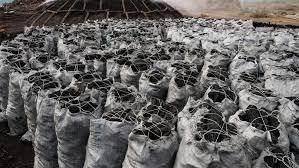Charcoal Prices Soar in Kano: Residents struggle with rising costs
In Kano, the price of charcoal has surged dramatically, causing significant concern among residents who rely on it for cooking and other energy needs. This steep increase has made charcoal increasingly unaffordable for many, exacerbating the city’s economic pressures.
Aisha Isa, a housewife in Kano, highlighted the extent of the price rise. A large bag of charcoal, which previously cost N4,000, now sells for around N6,500. She lamented that even small quantities of charcoal, which used to be available for N50, are now priced at N150. “It has become extremely difficult to find affordable charcoal anywhere in the city,” Isa said.
Similarly, Agnes John expressed her frustration with the rising costs. She argued that charcoal is becoming too expensive for the average person and called on the government to subsidise cooking gas to make it more affordable. “The cost of charcoal is gradually becoming unaffordable to the common man,” she said.
Mr. Baba Jibril, another resident, noted that he has relied on charcoal for its smoke-free and cost-effective qualities. However, with the price now reaching between N6,500 and N7,000 per bag, he is considering switching to firewood, despite its own high costs. “I am contemplating reverting to firewood but it is also expensive,” Jibril said.
Food vendor Hauwa Adamu from Tarauni noted that the high cost of kerosene and cooking gas has unexpectedly increased charcoal’s popularity. She explained that many people are turning to charcoal as a more economical alternative.
READ ALSO: Kano entrepreneurs revolutionise tech-sector with local USB cable production
Charcoal dealer Rabiu Abdullahi, who operates on France Road in Sabon-gari, attributed the price hike to soaring transportation costs. He explained that although the price of a sack of charcoal has risen from N4,500 to N6,700, demand remains high. Abdullahi pointed out that the cost of kerosene, which can amount to between N16,000 and N20,000 per month for a family, makes charcoal a more appealing option, as a bag can last up to two months.
Nura Garba, another trader in Dakata, linked the increase in charcoal prices to both high transportation costs and security issues. He noted that families are buying charcoal in larger quantities due to the rising cost of other energy sources. “We have continued to experience good and profitable business for some time now,” Garba said, adding that the increased demand has led to the sale of more than two bags of charcoal daily.
Follow the Neptune Prime channel on WhatsApp: https://whatsapp.com/channel/0029Va74ZvU2v1IqKByXoX3d
Follow the Neptune Prime channel on WhatsApp: https://whatsapp.com/channel/0029Va74ZvU2v1IqKByXoX3d
Do you have breaking news, interview request, opinion, suggestion, or want your event covered? Email us at neptuneprime2233@gmail.com


